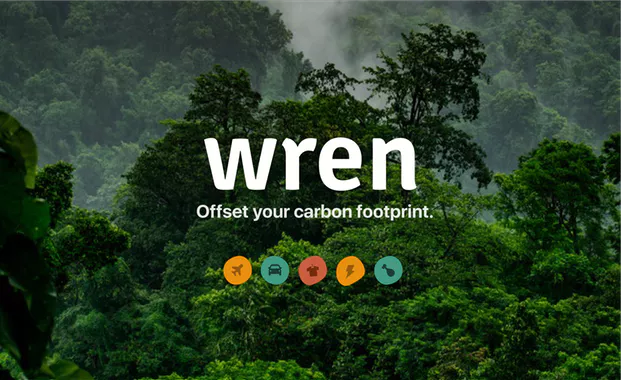A new online mobile platform looks to make it easier than ever for individuals to offset their personal carbon footprints.
The millennial generation is often hailed as carrying the banner for climate protection, especially in relation to their parents’ generation – the so-called Gen-X and Baby Boomers. However, their desire to protect the environment is often difficult to translate into practical environmentally friendly practices, especially when it comes to travel.
Millennials are the generation most likely to travel internationally, and according to BusinessInsider they are the group driving the most growth in the travel industry – including in carbon emissions from flights and other transportation. Equating these two desires – to protect the world, but also to travel it – cannot always be easy.
Faced with this climate conundrum, a Californian startup, Project Wren, has developed a new platform targeted towards millennials which can help them fully assess the impact of their lifestyles (including their travel habits) and then try to mitigate that by setting up a monthly donation to environmentally friendly projects – thus “offsetting” their carbon emissions.
Project Wren is an app in which users can tally up and record their carbon emissions from travel, diet, consumption and other aspects of general everyday life. The tool will then provide the user which a carbon offsetting price tag which can be donated directly via a monthly subscription to one of their partners engaged in environmental protection work – like sponsoring tree planting and workshops for farmers in East Africa, distributing clean cooking fuel for refugees in Uganda and working with local indigenous peoples in Peru using drones and satellite data to spot early warning signs of deforestation. Project Wren is careful to only support projects that have measurable impact and are transparent. Users are sent detailed updates on the projects they support every two weeks – in the form of satellite images and photos – and are also granted access to all of the data available on the project, so that they can verify that things really are developing as planned.
What is Carbon Offsetting?
Carbon offsetting is itself nothing new, and has now developed into a global industry which is valued at around 200 million USD a year. Essentially, an individual or company’s carbon emissions are calculated and then prescribed a monetary value. This payment is then used to fund carbon reduction efforts which in theory should reduce atmospheric carbon to an equivalent amount as the initial activity.
Traditionally, carbon offsetting has been limited to major corporations, such as oil companies, airlines and banks which make frequent use of air travel. Increasingly, however, it has been orientated towards the public consumer market. Carbon offsetting air travel has been available for several years, although more recently carbon offsetting has also been offered for many different types of lifestyle purchases, several of which are targeted towards millennials, such as concert tickets.

Ultimately, Project Wren hopes to extend this development, allowing consumers to become more individually responsible for their actions. The co-founder of Project Wren, Ben Stanfield, told Bloomberg that it was the failure of governments to meaningfully address climate issues that encouraged him to take matters into his own hands, stating:
“There’s lot of consumer demand for affordable action on climate change that isn’t in the form of traditional political activism. A lot of people are frustrated with how local and national governments are dealing with the problem.”
According to the Project Wren website, it currently has around almost 1000 subscribers which cumulatively have offset the same amount of carbon as removing 3,547 cars from the roads.
There are also additional platforms on the market – such as the Oslo-based Chooose – which also allow for similar monthly donations from concerned consumers to environmental practices, essentially updating traditional charitable giving to the 21st century. In this regard, platforms such as Chooose and Project Wren may be more visible and accessible to an urban, on-the-go demographic who are used to arranging and living their lives via a smartphone.
Is Carbon Offsetting Greenwashing?
Relying on carbon offsetting to protect the climate, however, can only be part of a broader solution. In general, it would be much better to prevent producing the carbon in the first place, than to attempt to repair the damage after it has been done. Indeed, carbon offsetting has been accused of so-called ‘greenwashing’, in which environmentally concerned consumers and businesses can appear to espouse green credentials without actually adjusting their behaviour.
In that sense, carbon offsetting can be seen more as a way to repair a guilty conscious than repair the environment. In truth, the only immediately meaningful way to help the environment as an individual is to adjust your behaviour – which may include making sacrifices in terms of travel and consumption. Furthermore, although shifting responsibility to the consumer may result in more funds for environmental projects, it could also lead to a precedent in which companies and businesses – which produce the vast majority of pollution – shirk responsibility in exchange for palming it off to their end consumer.
Maybe in the future, Project Wren will use the monthly donations to support solutions that tackle the systemic issues underlying the ever-increasing carbon emissions – such as sponsoring lobbying groups to push corporations to move to cut their emissions more quickly. But making carbon offsets more accessible and raising public awareness of the carbon footprint that we create each day, also seems like a good place to start.






